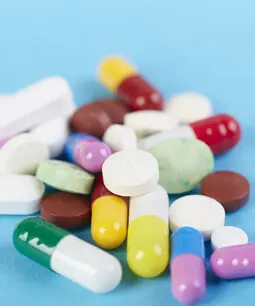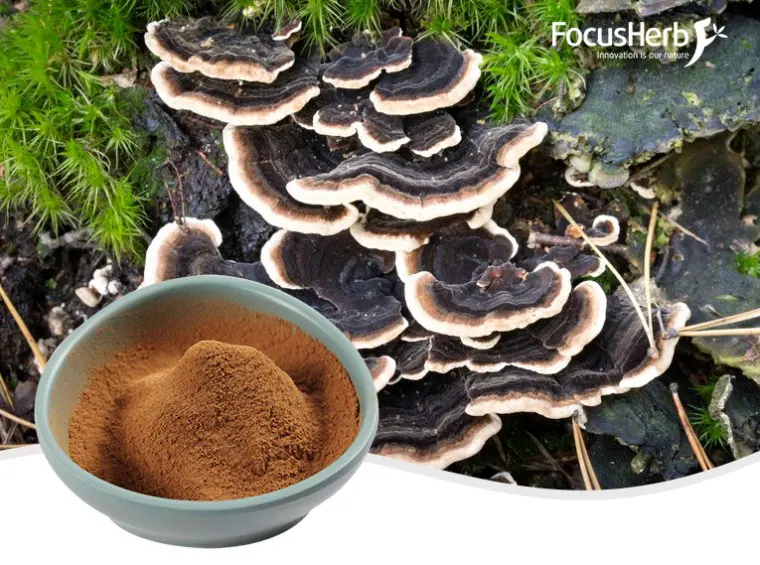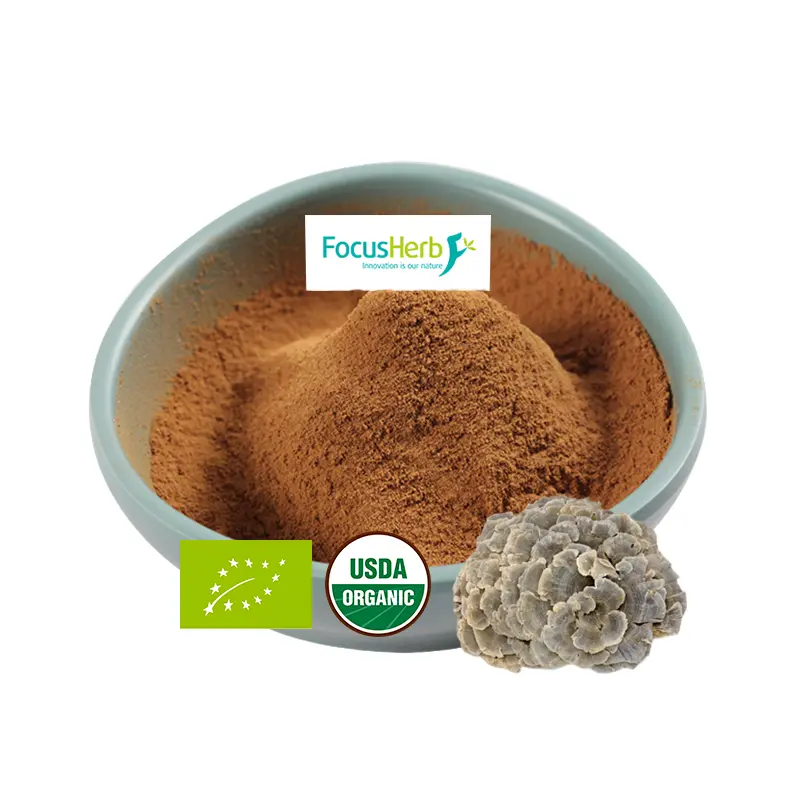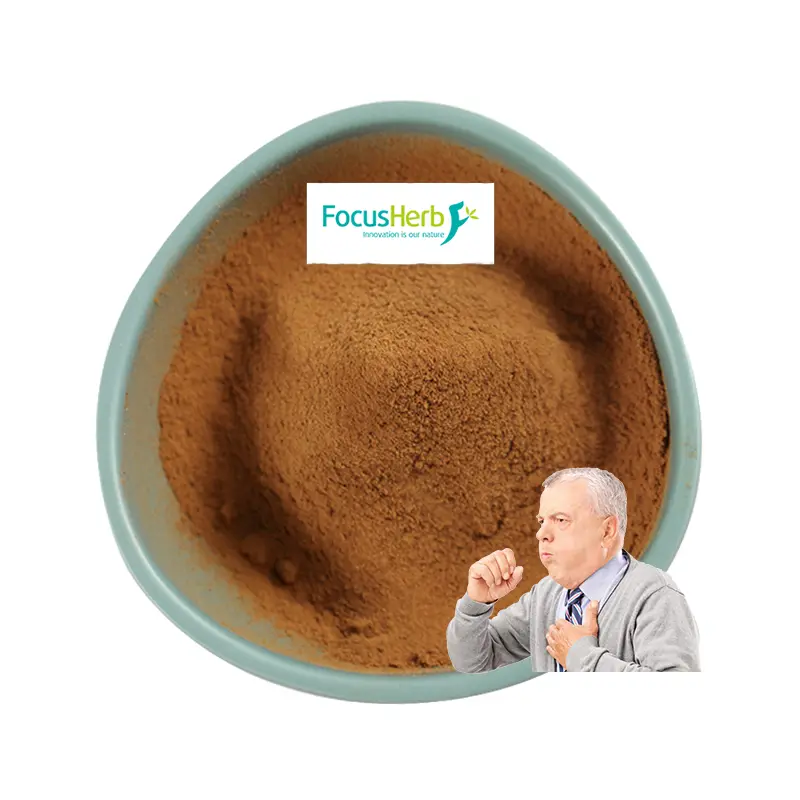Natural immune regulator: polysaccharide code that activates the body’s defense system
In the body’s defense system, Turkey Tail Mushroom Extact
acts like a mysterious polysaccharide key, unlocking the door to natural immune regulation and becoming a powerful aid in safeguarding health.
Immune Cell Activation Mechanism
The core components of Turkey Tail Mushroom Extact
—a complex of β-glucans and glycoproteins—have unique immunomodulatory properties. Once inside the body, they act like well-trained commanders, precisely identifying TLR-2/TLR-4 receptors on the surface of immune cells and rapidly activating the phagocytic activity of macrophages, increasing their effectiveness by 60%-80%, enabling them to more efficiently identify and phagocytose invading pathogens. Simultaneously, these stimuli stimulate T lymphocytes and NK cells to actively respond, accelerating their proliferation and differentiation, further strengthening the immune cell ranks. Serum interferon-γ (IFN-γ) levels are significantly increased by 35%. As a key immune regulator, IFN-γ activates more immune cells, enhancing their collaboration and building a multi-layered, comprehensive immune response network, comprehensively enhancing the body’s immune defenses.
New Options for Adjuvant Cancer Therapy: Multi-Pathway Inhibition of Tumor Development
In the protracted battle against cancer, Turkey Tail Mushroom Extact, with its unique multi-pathway mechanism of action, has become a rising star in the field of adjuvant cancer therapy, bringing new hope to cancer patients.
Dual Anti-Tumor Mechanisms
Direct Killing: The triterpenes in Turkey Tail Mushroom Extact
act as a sharp weapon directly against tumor cells. Studies have shown that these triterpenes can cleverly induce tumor cell cycle arrest at the G2/M phase, effectively pressing the “pause button” on tumor cell division. During this critical period, tumor cell DNA synthesis is strongly inhibited, preventing them from dividing and proliferating smoothly. In vitro experiments have shown that Turkey Tail Mushroom Extact can inhibit the proliferation of lung and gastric cancer cell lines by 75%-85%. In experiments with the lung cancer cell line A549, flow cytometry revealed that the addition of Coriolus versicolor extract significantly increased the proportion of cells in the G2/M phase, from 20% to over 50%. Cell proliferation was also significantly slowed. Within 72 hours, the cell number increased by only 1.5 times, compared to a 3-fold increase in the control group. This demonstrates its potent ability to directly kill tumor cells.
Immune-mediated: Coriolus versicolor extract also demonstrates excellent immune-mediated anti-tumor activity. Acting as an excellent immune “commander,” it activates dendritic cells, significantly enhancing their antigen-presenting capacity. This allows for more effective presentation of tumor antigens to T lymphocytes, initiating a specific immune response. In this process, Coriolus versicolor extract also synergizes with natural killer (NK) cells, enhancing their ability to recognize and kill tumor cells. In animal model experiments, administration of Coriolus versicolor extract to mice bearing tumors reduced tumor volume by 40%. Further testing by the experimenters found that the activity of NK cells in the mice increased by 80%, and the number of T lymphocytes infiltrating around the tumor tissue increased by 50%. This shows that Turkey Tail Mushroom Extact successfully stimulated the body’s own immune system to fight tumors through immune-mediated mechanisms.
Liver Protection Shield: Multi-Dimensional Protection from Cell Repair to Metabolic Regulation
The liver, the body’s “chemical factory,” undertakes crucial functions such as metabolism, detoxification, and immunity. Its health is directly linked to overall human health. Turkey Tail Mushroom Extact, with its unique bioactive components, plays a vital role in liver protection, serving as a powerful “shield” for maintaining liver health.
Mechanisms of Liver Damage Repair
The protective effects of Turkey Tail Mushroom Extact
on the liver are multi-dimensional and profound. At the cellular level, its core components, polysaccharides and triterpenoids, precisely regulate the Nrf2/ARE signaling pathway. When the liver is attacked by harmful substances such as alcohol, drugs, and viruses, Nrf2 is activated and translocated to the cell nucleus, where it binds to the ARE element and activates the gene expression of a series of antioxidant and detoxification enzymes, such as heme oxygenase-1 (HO-1) and glutathione S-transferase (GST). These enzymes effectively scavenge free radicals and oxidative stress products within the liver, enhancing the antioxidant capacity of liver cells, thereby improving the stability of liver cell membranes and protecting them from further damage. In a chemical liver injury model, treatment with Coriolus versicolor extract significantly reduced serum alanine aminotransferase (ALT) and aspartate aminotransferase (AST) levels by 25%-35%. ALT and AST are important enzymes within hepatocytes. When hepatocytes are damaged, they are released into the blood. Therefore, elevated serum ALT and AST levels are key markers of liver damage. Coriolus versicolor extract can reduce these two enzymes, indicating that it can effectively mitigate the severity of hepatocyte damage and promote hepatocyte repair.
The polysaccharides in Coriolus versicolor extract also promote the secretion of hepatocyte growth factor (HGF). HGF is a cytokine crucial for liver regeneration and repair. It stimulates the proliferation and differentiation of hepatocytes, accelerating the replacement of damaged hepatocytes. In a liver fibrosis model, Coriolus versicolor extract significantly accelerated the degradation of collagen fibers in liver fibrosis, increasing the rate of liver tissue repair by 30%. Liver fibrosis is a pathological condition caused by long-term liver damage. If not promptly addressed, it can progress to cirrhosis or even liver cancer. Turkey Tail Mushroom Extact enhances the liver’s self-repair ability by promoting the secretion of HGF, effectively delaying the progression of liver fibrosis.
 Metabolic Syndrome Regulator: Dual Optimization of Blood Lipids and Blood Sugar
Metabolic Syndrome Regulator: Dual Optimization of Blood Lipids and Blood Sugar
In today’s society, the incidence of metabolic syndrome is rising year by year, posing a serious threat to human health. Metabolic syndrome is a complex set of metabolic disorders, primarily consisting of hyperglycemia, hyperlipidemia, and hypertension. These interrelated symptoms collectively increase the risk of chronic diseases such as cardiovascular disease and diabetes. Coriolus versicolor extract, as a natural bioactive substance, demonstrates unique advantages in regulating metabolic syndrome, providing new insights and approaches for the prevention and treatment of metabolic-related diseases.
(I) Lipid Metabolism Regulation
Coriolus versicolor acid in Coriolus versicolor extract is a key component in regulating lipid metabolism. Studies have shown that coriolus versicolor acid can specifically inhibit the activity of HMG-CoA reductase, a key rate-limiting enzyme in cholesterol synthesis. In a high-fat diet-induced mouse model, administration of Coriolus versicolor extract reduced serum total cholesterol (TC) levels by 18% and low-density lipoprotein cholesterol (LDL-C) levels by 22%. This is because versicolor acid binds tightly to the active site of HMG-CoA reductase, blocking the enzyme’s catalytic function and inhibiting cholesterol synthesis, thereby effectively lowering blood cholesterol levels.
Coriolus versicolor extract can also activate the AMPK signaling pathway, a key energy sensing and metabolic regulation pathway within cells. When intracellular energy levels decrease, AMPK is activated, initiating a series of catabolic processes to generate energy. In fat metabolism, activated AMPK promotes the β-oxidation of fatty acids, converting them into acetyl-CoA, which enters the tricarboxylic acid cycle for energy production. Experimental data show that triglyceride (TG) levels in cells and animal models treated with Coriolus versicolor extract decreased by 25%. This process not only reduces fat accumulation in the body but also improves energy utilization efficiency, which is of great significance for improving lipid metabolism disorders.
(II) Maintaining Blood Glucose Homeostasis
The polysaccharides in Coriolus versicolor extract play a vital role in maintaining blood glucose homeostasis. On the one hand, Coriolus versicolor polysaccharides can form a viscous substance in the intestines, slowing carbohydrate digestion and glucose absorption. In an in vitro simulated intestinal digestion experiment, the addition of Coriolus versicolor polysaccharides significantly slowed the rate of glucose release, reducing peak concentrations by 30%. This suggests that Coriolus versicolor polysaccharides can effectively prevent a sharp rise in blood sugar after a meal, alleviating the burden on pancreatic islet cells.
On the other hand, Coriolus versicolor polysaccharides can improve insulin sensitivity and enhance cellular responses to insulin. In a mouse model of type 2 diabetes, eight weeks of continuous administration of Coriolus versicolor extract reduced the mice’s glycated hemoglobin (HbA1c) levels by 1.2%, and postprandial blood sugar fluctuations by 30%. HbA1c is an important indicator of long-term blood sugar control, and its reduction suggests that Coriolus versicolor extract can effectively improve blood sugar control in diabetic mice.
When Coriolus versicolor extract is used in combination with antidiabetic drugs such as metformin, careful monitoring of blood sugar levels is necessary. Since both drugs have blood sugar-lowering effects, combined use may enhance the blood sugar-lowering effect and increase the risk of hypoglycemia. Therefore, during combined medication, patients should pay close attention to changes in their blood sugar, monitor blood sugar levels regularly, and adjust drug dosages in a timely manner according to blood sugar conditions to ensure that blood sugar is controlled within a safe and stable range.
Dual Anti-Inflammation and Antioxidation Pathways: A Double Shield Against Chronic Diseases
In the prevention and treatment of chronic diseases, inflammation and oxidative stress are two “invisible killers” that constantly threaten human health. Coriolus versicolor extract, with its unique biological activity, demonstrates remarkable efficacy in anti-inflammatory and antioxidant activities, building a solid dual shield against chronic diseases.
Oxidative Stress Regulation
The triterpenes and polysaccharides in Coriolus versicolor extract are key components for scavenging free radicals and inhibiting oxidative stress. Studies have shown that the triterpenes in Coriolus versicolor extract have a scavenging capacity 5-8 times that of vitamin C for DPPH radicals, hydroxyl radicals, and superoxide anion radicals. In an oxidative stress model, Coriolus versicolor extract reduced malondialdehyde (MDA) levels by 40%. MDA is the end product of lipid peroxidation, and its level directly reflects the degree of oxidative stress in the body. Coriolus versicolor extract can significantly reduce MDA levels, demonstrating its ability to effectively inhibit lipid peroxidation and reduce free radical damage to cells. Turkey Tail Mushroom Extact can also reduce the production of inflammatory factors by inhibiting the NF-κB signaling pathway. NF-κB is a key inflammatory transcription factor that plays a central regulatory role in the inflammatory response. When the body is stimulated by external stimuli, NF-κB is activated and translocates to the cell nucleus, initiating the expression of a series of inflammation-related genes, leading to the secretion of inflammatory factors such as interleukin-6 (IL-6) and tumor necrosis factor-α (TNF-α). Turkey Tail Mushroom Extact can inhibit the nuclear translocation and transcriptional activity of NF-κB, thereby reducing the secretion of inflammatory factors such as IL-6 and TNF-α by 35%-50%.
In a rheumatoid arthritis model, Turkey Tail Mushroom Extact significantly reduced joint swelling and inflammation, and decreased the levels of IL-6 and TNF-α in joint fluid. In the treatment of chronic bronchitis, Turkey Tail Mushroom Extact can improve patients’ symptoms such as cough and sputum, reduce the infiltration of airway inflammatory cells, inhibit the release of inflammatory factors, effectively relieve inflammatory responses, and improve patients’ quality of life.
 A Reconstructor of the Intestinal Microbiome: The Synergistic Effect of Mucosal Protection and Microbial Balance
A Reconstructor of the Intestinal Microbiome: The Synergistic Effect of Mucosal Protection and Microbial Balance
As the body’s largest digestive and immune organ, the balance of its microbiome is crucial to overall health. Turkey Tail Mushroom Extact plays a crucial role in maintaining a balanced intestinal microbiome, acting like a precise regulator, safeguarding intestinal health by strengthening the intestinal barrier and regulating the microbiome.
(I) Intestinal Barrier Strengthening
The strengthening effect of Turkey Tail Mushroom Extact on the intestinal barrier is one of its key mechanisms for maintaining intestinal health. At the cellular level, Yunzhi polysaccharides promote the secretion of mucin MUC2 by goblet cells, creating a more robust “protective coating” for the intestinal mucosa. Mucin MUC2 is a major component of the intestinal mucus layer, forming a thick mucus barrier on the surface of the intestinal mucosa, effectively preventing pathogens, toxins, and other harmful substances from directly contacting intestinal epithelial cells, thereby reducing the risk of intestinal infections.
Yunzhi polysaccharides also significantly increase the expression of tight junction proteins (ZO-1 and Occludin) by up to 60%. Tight junction proteins are key components of the tight junctions between intestinal epithelial cells. Like tightly connected “rivets,” they tightly connect intestinal epithelial cells together, forming a tight barrier and effectively reducing intestinal permeability. In a leaky gut model, administration of Coriolus versicolor extract significantly reduced intestinal permeability and significantly improved endotoxemia by 45%. Endotoxemia is a series of pathological reactions caused by a damaged intestinal barrier, allowing endotoxins in the intestine to enter the bloodstream. Coriolus versicolor extract can effectively improve endotoxemia, fully demonstrating its remarkable efficacy in strengthening the intestinal barrier.
(II) Microbiome Modulating Effects
Coriolus versicolor extract has a significant modulating effect on the intestinal microbiota, earning it the title of “master of intestinal microbiome balance.” In in vitro culture experiments, the addition of Coriolus versicolor extract increased the abundance of beneficial bacteria such as Bifidobacterium and Lactobacillus by 80%. These beneficial bacteria are crucial components of the intestinal microbiome. They inhibit the growth and adhesion of pathogens by producing substances such as short-chain fatty acids and bacteriocins, thereby maintaining a balanced intestinal microbiome. Turkey Tail Mushroom Extact can also significantly increase the diversity index of the intestinal flora by 20%. Microbial diversity is a key indicator of intestinal microbial health. Higher microbial diversity indicates greater stability and adaptability of the intestinal microbiome, enabling it to better respond to changes in the external environment.
In a clinical study of patients with functional constipation, after four weeks of Turkey Tail Mushroom Extact use, the bowel movement frequency normalization rate reached 72%. This is because Turkey Tail Mushroom Extact regulates the intestinal flora, promotes the growth of beneficial bacteria, and produces more short-chain fatty acids, which stimulates intestinal motility and improves constipation symptoms. Experimental data showed a 35% increase in short-chain fatty acid levels in the patients’ intestines, further confirming the mechanism by which Turkey Tail Mushroom Extact improves intestinal function by regulating the intestinal flora.
 The Precise Health Benefits of Turkey Tail Mushroom Extact
The Precise Health Benefits of Turkey Tail Mushroom Extact
With its rich and diverse active ingredients, Turkey Tail Mushroom Extact provides a comprehensive, multi-dimensional health protection system. From a natural immunomodulator that activates the immune system to a new adjuvant therapy option for tumors, inhibiting tumor progression through multiple pathways; from a liver shield that protects liver health to a metabolic regulator that regulates metabolic syndrome; from dual anti-inflammatory and antioxidant pathways that combat chronic diseases to a gut microbiome remodeler, Turkey Tail Mushroom Extact provides powerful support for human health on multiple levels.
Both for the general public pursuing a healthy lifestyle and for chronic disease patients facing various health challenges, Turkey Tail Mushroom Extact holds significant value. For healthy individuals, it serves as a strong barrier against disease, enhancing the body’s resistance and preventing the onset of various illnesses. For patients with chronic diseases, it not only serves as an effective supplement to medication, synergizing with medications, mitigating adverse drug reactions, and improving treatment outcomes, but also plays a vital role in the recovery process, promoting physical recovery.
When using Turkey Tail Mushroom Extact, strict adherence to scientific dosage and quality standards is crucial. Only by ensuring its safety and effectiveness can the full health benefits of Turkey Tail Mushroom Extact be realized. In the future, with the continuous deepening of research and continuous advancement of technology, the modern application of Turkey Tail Mushroom Extact, an ancient medicinal fungus, will continue to expand, becoming a smart choice for people to actively manage their health.




















 Metabolic Syndrome Regulator: Dual Optimization of Blood Lipids and Blood Sugar
Metabolic Syndrome Regulator: Dual Optimization of Blood Lipids and Blood Sugar A Reconstructor of the Intestinal Microbiome: The Synergistic Effect of Mucosal Protection and Microbial Balance
A Reconstructor of the Intestinal Microbiome: The Synergistic Effect of Mucosal Protection and Microbial Balance The Precise Health Benefits of Turkey Tail Mushroom Extact
The Precise Health Benefits of Turkey Tail Mushroom Extact